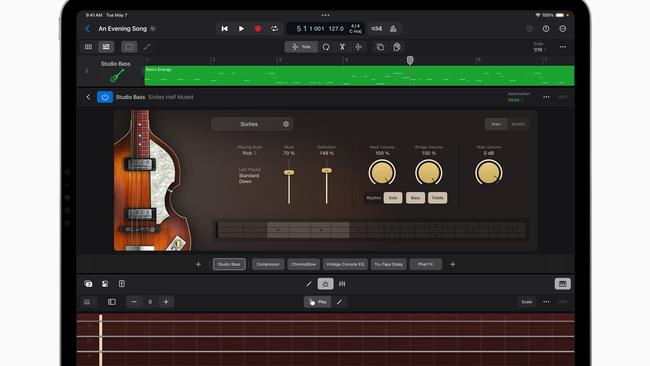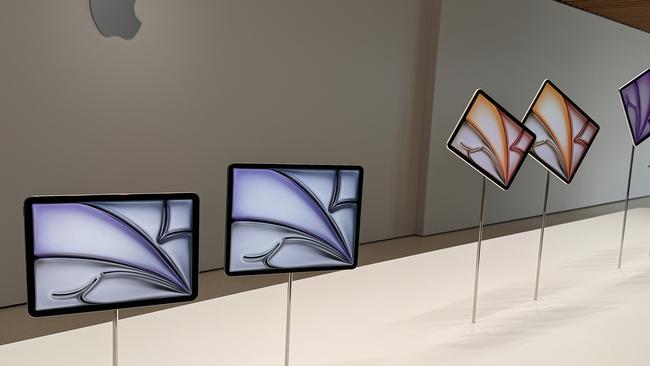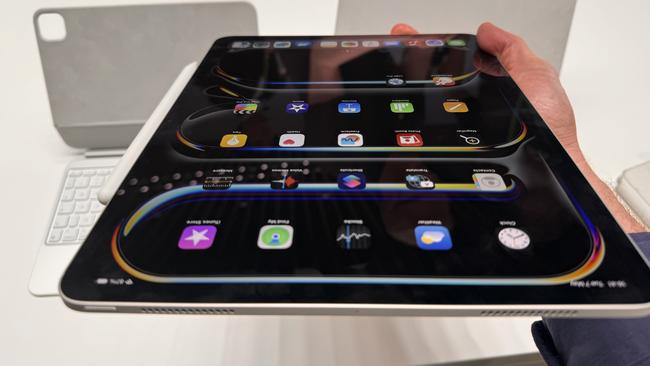Apple’s new iPads take inspiration from The Beatles’s last song as it enters the AI race
Jaws dropped when filmmakers were able to isolate John Lennon’s voice from an old demo recording. Apple has now made similar tech available with its new iPads.

When the surviving Beatles released Now and Then — more than 50 years after their break-up — it sparked a flurry of debate about the possibilities of artificial intelligence, particularly in regard to resurrecting dead celebrities.
In The Beatles’s case, they had tried unsuccessfully 25 years ago to produce a track from a scratchy demo recording John Lennon made in his apartment in New York before his assassination in 1980.
They couldn’t separate Lennon’s voice from the piano — making the project unworkable — until New Zealand film director Peter Jackson developed a powerful machine learning tool when he was producing The Beatles’ Get Back film.
Now, six months after the release of Now and Then, tech giant Apple is making this technology accessible to anyone with an iPad, after it finally entered the artificial intelligence race.
Apple is not known as being first to market, and in AI rivals Microsoft and Samsung have seemingly vaulted ahead. But, when Apple does release a new product it is able to generate demand and profits — think the iPhone, iPod, Apple Watch — even the original Apple I in the 1970s.
Apple didn’t invent smartphones, smart watches, MP3 players or personal computers. Its formula for success is to take an existing product, make it better through innovation, then link it back into its ecosystem of software and services.
And it is hoping to do the same again with AI and prove to investors it’s not falling behind, gaining a foothold in what has been branded a technological advancement bigger than the launch of PCs, the internet and social media.
It released four new “outrageously powerful” iPads at its UK headquarters at the restored Battersea Power Station in London — a few suburbs south of where The Beatles made their famous recordings at Abbey Road Studios.
The iPads are thinner, with the Pro models having brighter OLED screens and a new generation of chips which allows them to boost on-device AI performance.
Apple also unveiled a new pencil, an Apple Pencil Pro, and a new Magic Keyboard — which now has a function key row — to give the iPad more MacBook-like usability.
Apple chief executive Tim Cook said: “this is the biggest day for iPad since its introduction” in 2010. The new M4 chip in the iPad Pro models — which is the first time Apple has unveiled a next generation processor in an iPad — uses half the energy as the M2 version, allowing it to perform a range of AI power-hungry tasks.

In regard to one of the AI-enhanced features, Apple says it took inspiration from Jackson when it developed its new Logic Pro software. The tech giant was clearly a fan of The Beatles’s Now and Then, using the song to great effect as a motif in the blockbuster film Argylle it produced and released on its Apple TV+ streaming service.
Jackson was able to ‘resurrect’ Lennon by training a computer what each of The Beatle’s voices and their instruments sounded like, allowing him to isolate each one and build multiple tracks on those which were previously locked on a single recording, like a demo tape.
From there, the recording was reproduced and new instruments and vocal tracks were added, catapulting The Beatles’s sound into the 21st century.
This is what Logic Pro now offers to the masses. Brent Chiu-Watson, Apple’s senior director of apps worldwide product marketing, said the “stem splitter” on Logic Pro aimed to allow high quality recordings to be produced from a recording made on something as simple as a Voice Memo.
“Most musicians perform their best without the pressure of a formal studio session,” Mr Chiu Watson said.
“These moments are often found in Voice Memos recordings, an old demo cassette tape, or are captured from a live show. Listening back, these recordings can reveal magical performances that are nearly impossible to recreate, making them lost to time.
“Now, with Stem Splitter, an artist can recover moments of inspiration from any audio file and separate nearly any mixed audio recording into four distinct parts: drums, bass, vocals, and other instruments, right on the device. With these tracks separated, it’s easy to apply effects, add new parts, or change the mix.”

Making this possible is Apple’s in-house computer chips, known as the M-series or Apple Silicon. The company unveiled its next generation M4 processor in London on Tuesday in its new iPad Pros — the first time it has used a tablet to release a computer chip.
While The Beatles used existing and new recordings to produce Now and Then — with Paul McCartney declaring nothing on the track was fake — Logic Pro also offers musicians the ability to record AI-generated instruments. They can record an AI drumming track, bass or keyboard player which also responds to feedback from the human musician.
Apple says this is not designed to replace real session musicians but allow songwriters to capture their ideas in the form of a high quality demo which can then be re-recorded later by actual human musicians.
This is similar to how many knowledge workers — from staff at the big banks to engineering firms — are using generative AI. The technology allows them to deal with the paralysing feeling of staring at a blank screen and start testing ideas, which they then refine.
In Logic Pro, Apple says the AI ‘session musicians’ are designed to “augment the live-playing experience while ensuring artists maintain full agency during any phase of their music making process”.

But, it’s not just music Apple is looking to revolutionise via AI. It also released a new version of its video editing software Final Cut Pro.
Updates include a suite of AI features which allow editors “to rapidly customise the look of videos or photos in a single click,” fast-tracking processes including colour correction and video effects.
Filmmakers no longer need a green screen, with Final Cut Pro’s AI able to automatically isolate elements — such as dancing humans — from a video to create special effects without the need for tedious rotoscoping.
“Final Cut Pro for iPad is getting more powerful, transforming production workflows for creators by putting iPad at the centre and allowing them to edit and share more quickly than ever, whether they’re at the studio or on the go,” Chiu Watson said.
Another update included Live Multicam, allowing users to synch the cameras on their iPhones and iPad wirelessly to create different angles on the one recording.
Apple released this feature in a new video capture app, Final Cut Camera, which it says allow filmmakers to “speed up their shoot by allowing them to connect and preview up to four cameras at once”.
Apple’s senior vice president of hardware engineering John Ternus said the 13 inch iPad Pro was the thinnest product the company has produced — beating the iPod Nano – measuring 5.1mm, a feat he said would not be possible without the M4 processor.

He said a more powerful chip also enabled the iPad Pro to complete a range of AI features on device and in the cloud for use in such programs as Microsoft’s Copilot and Adobe Firefly.
“This is the iPad we’ve always dreamt of making,” Mr Ternus said.
Underpinning the enhanced performance is the M4 chip’s neural engine, which Mr Ternus said is capable of 38 trillion operations per second, making it 60x faster than its first A11 Bionic chip launched seven years ago.
“The M4 can deliver the same performance as M2 using just half the power,” he said. “That’s a tremendous gain in performance. Now when you compare it with the latest PC chip in a thin and light laptop, M4 can deliver the same performance using just a quarter of the power.”
The new Apple Pencil Pro has so far been well received from creatives. It features a sensor in the barrel to enable a “user’s squeeze” to allow palette tool changes, such as line weights and colours, “without interrupting the creative process”.
Meanwhile, a gyroscope allows users to roll Apple Pencil Pro for precise control of the tool they’re using. Rotating the barrel changes the orientation of shaped pen and brush tools, which Apple says makes it act like pen and paper. It also features a hover function, in which users can see what a pencil mark looks like before they make it, as well as haptic feedback to provide a more tangible experience.
The impressive specifications and features are clearly aimed at thrusting Apple into a dominant position in the AI race, showing how its near 50-year-old recipe for success is far from tired.
Apple shares firmed 0.4 per cent to close at $US182.40 ($277.29) after it launched the new iPads, with this week’s gains so far at 6 per cent, giving it a market cap of $US2.8 trillion. Investors will now be closely watching the tech titan’s execution as it advances its AI strategy.
The author travelled to London as a guest of Apple.




